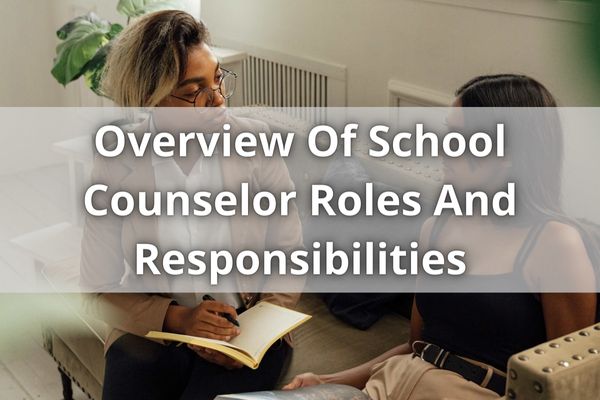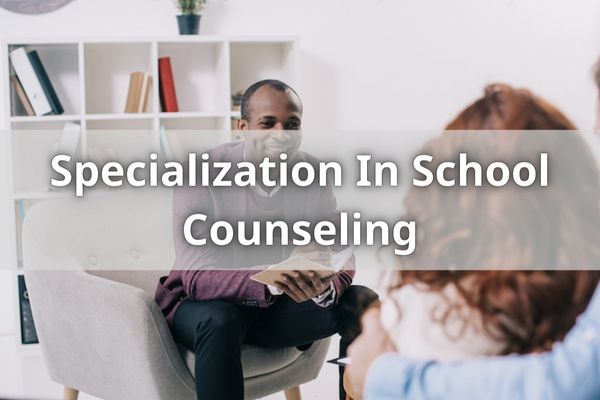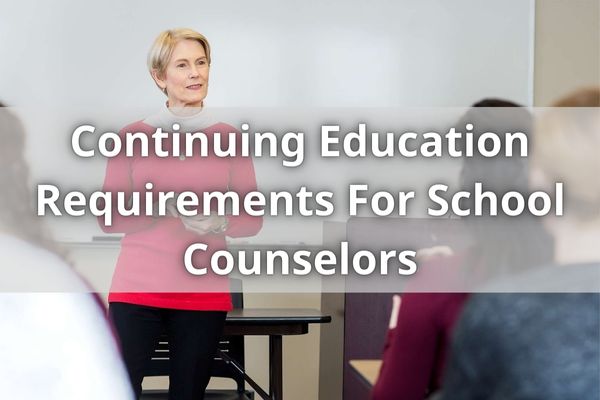What Are The Educational Requirements To Become A School Counselor?
What Are The Educational Requirements To Become A School Counselor? Becoming a school counselor is both rewarding and challenging. I am enthusiastic about assisting children in realizing their full potential as a student advocate.
A school counselor must fulfill a number of educational prerequisites in order to practice. These include bachelor’s degree programs, master’s degree programs, specialization in counseling, professional organizations and continuing education requirements. Additionally, internships and practicum requirements are also important.
It is important to note that job outlooks for school counselors are positive, with a projected job growth of 8% from 2019 to 2029. This is faster than the average for all occupations.
Overall, becoming a school counselor requires dedication and hard work, but it is a fulfilling career that allows you to make a positive impact on the lives of young people.
Overview Of School Counselor Roles And Responsibilities

Finding out what a counselor does may be incredibly useful in determining if this is the correct job for you.
In order to establish the best learning environment possible, school counselors may also collaborate with pupils, parents, teachers, and other community members. They provide guidance on academic and school social worker issues, help set educational goals, develop individualized plans to reach those goals, and offer support for personal concerns.
They must possess a degree in counseling along with requirements for certification that may vary by state or district. To fulfill these requirements they should attend a comprehensive school counseling program specifically designed to prepare them for working in the school setting.
It’s important to note that this is just an overview of what being a school counselor entails as there are many different aspects involved in being successful in this profession.
The next step is understanding the educational requirements needed to become a school counselor.
Educational Requirements For School Counselors
Understanding the requirements for being an effective counselor is crucial, and this section will assist you in doing so!
There are specific educational prerequisites that must be satisfied in order to become a school counselor:
- School counselors need the following qualifications in order to be certified:
- A bachelor’s degree in counseling, education, or psychology from a university with accreditation.
- An approved internship program.
- Beyond basic school counseling certification requirements, some states may require additional educational qualifications such as completing a master’s degree in counseling or a related field.
By understanding the educational requirements for becoming a school counselor, individuals can ensure they meet the necessary standards and are ready for their role. With this knowledge in hand, people can begin to explore options for pursuing their degree program and other necessary certifications.
Bachelor’s Degree In Psychology, Education Or Counseling
If you’re looking to jumpstart your career in counseling, having a bachelor’s degree in psychology, education, or counseling is essential! A school counselor must have a comprehensive school knowledge of all the areas that counseling covers.
Therefore, earning a bachelor’s degree in one of these areas will provide you the skills you need to pursue this career. An education in psychology, for instance, may teach you about human behavior and help you get ready for the challenges of dealing with pupils. Similarly, an education-related degree will give you an understanding of educational policies and procedures which can be useful when dealing with administrative issues.
And last, earning a bachelor’s degree in counseling might help you develop more specific understanding on how to deal with mental health issues and offer support to people who need it the most.
Having at least a bachelor’s degree is essential for succeeding as a school counselor, regardless of the path you choose.
Having set the groundwork for becoming a school counselor, the following step would be to earn a master’s degree in counseling or school counseling.
Master’s Degree In Counseling Or School Counseling
The information and abilities required for success as a professional school counselor must be developed via the completion of a master’s degree in counseling or school counseling. Beyond a bachelor’s degree, a school counseling master’s program in this discipline normally necessitates two years of study. This includes courses that focus on topics such as human growth and development, group dynamics, assessment techniques, clinical interventions, and research methods.
The requirements for receiving your master’s degree vary by state. However, generally, you will need to complete supervised internships that include experience with both individual and group clients. Most states also require licensure after completion of the program, which includes passing an exam. Additionally, many states require counselors to participate in continuing education programs throughout their career.
Earning a master’s degree in counseling or school counseling is an important step towards becoming a school counselor and meeting state requirements.
Specialization In School Counseling

You may improve your knowledge and abilities to become a successful professional counselor by specializing in school counseling. The study of school counseling career is crucial since it entails getting to know students’ needs, building connections with them, and eventually assisting in their success in life.
It requires specialized training to understand how best to serve these students and provide guidance on their educational and personal development. Joining the American School Counselor Association (ASCA), which offers resources for people who want to specialize in this subject, is advised if you want to become a school counselor.
Additionally, before being eligible for a licensed school counselor education, several states demand that school counselors also complete state certification or licensing requirements. This includes taking courses related to mental health, child development, learning theory, academic advising, career exploration, and more. With the right training and experience, specializing in school counseling can prepare you for success as a guidance counselor in any setting.
State Certification Or Licensure Counselor Requirements
You need to complete state certification or licensure requirements in order to gain the skills and knowledge needed to be a successful counselor. The state board of education determines the school counselor job description, school counselor salary information, and qualifications necessary for each state.
Furthermore, some states may require additional certifications such as a national counselor exam or specialized certifications like bilingual proficiency. Requirements can vary from state to state so it’s important to research what’s expected in your area before pursuing a career in counseling.
In addition to the basic credentialing process, many states also provide advanced certification options that allow counselors to specialize in certain areas such as mental health counseling, college admissions counseling, or substance abuse prevention and treatment. This specialized training helps counselors hone their skills and gain expertise in specific areas of school counseling.
Specialized Training For School Counselors
After obtaining the necessary state certification or licensure requirements, the educational requirements to become a school counselor involve specialized training. Aspiring school counselors must obtain a Master’s in School Counseling from an accredited program. This degree can be coupled with continuing education courses to achieve certification as a certified school counselor.
To satisfy the educational requirements of becoming a school counselor, one should consider:
- Obtaining a Master’s Degree in School Counseling from an accredited program
- Taking continuing education courses for additional credits
- Becoming certified as a school counselor through the appropriate organizations
By completing these steps and meeting all of the educational requirements, individuals can move on to professional organizations for school community in order to gain more experience and knowledge within a school counselor.
Professional Organizations For School Counselors
Gaining experience and knowledge in your field is easy when you join professional organizations for school counselors! Many of these groups offer helpful resources to those who are already certified or looking to obtain their school counselor certification.
For instance, the American School Counselor Association (ASCA) offers a lot of information on how to complete a school counseling masters program or acquire a master’s degree in school counseling. They also offer assistance and direction to individuals who wish to obtain a bachelor’s degree in the relevant discipline. A person may learn more about the field and acquire important insight into what it takes to succeed as a school counselor by joining an organization like ASCA.
Professional associations can provide excellent options for school counselors to fulfill their continuing education obligations. These groups frequently host conferences, workshops, seminars, and other gatherings that let people keep up with the latest advancements in the field of school counseling. Additionally, they could hold webinars on matters like obtaining a master’s degree, seeking for a school counselor license, or finishing the continuing education requirements set forth by state boards of education.
Joining one of these organizations can help aspiring professionals stay informed about the latest trends in their chosen profession while also providing them with invaluable networking opportunities with fellow counselors and educators.
Continuing Education Requirements For School Counselors

Continuing your education is a great way to stay up-to-date on the latest developments in the field and keep your counseling career moving forward! For school counselors, one of the primary requirements is obtaining a Master’s degree in School Counseling Program. This may include classes such as:
- Theory and Practice in School Counseling
- Human Growth and Development
- Assessment Techniques
- Group Dynamics for School Counselors
School counselors must also complete continuing education courses to maintain their license in many states. School counselors may keep current on developing trends and innovative approaches to assisting children in succeeding academically, emotionally, behaviorally, and socially by taking these courses, which give updates on current research and best practices in the area.
School counselors may make sure they’re giving children the best care possible by remaining current with their continuing education obligations.
Internships And Practicum Requirements For School Counselors
Completing internships and practicums is an integral part of a school counselor’s journey, allowing them to gain hands-on experience in the field. Depending on the degree program, some may be required while others are optional.
For instance, if a person gets a master’s degree from a regionally accredited college and career that offers a program in school counseling, their degree may still need to be completed with an internship or practicum. Additionally, even if a person’s degree was not earned from an authorized university that provides a program in school counseling, they can still be needed to do a school counseling internship in order to meet the requirements for state licensing or certification.
Internships and practicums provide prospective counselors with invaluable insights into what it means to work directly with students in a professional capacity. This experience can help aspiring counselors determine whether this is the right career path for them before investing time and money into furthering their education in school counseling. With this knowledge at hand, they can make informed decisions about their future career goals and job outlook for school counselors.
Job Outlook For School Counselors

Gaining practical experience through internships and practicums is an important step in becoming a school counselor, and your job outlook can be greatly impacted by this. A career as a school counselor can be highly rewarding, but requires specialized education and certification. Here are some key points to consider when thinking about the job outlook for school counselors:
- School counselors must have at least a master’s degree in counseling or closely related field in order to become certified.
- Most states require that school counselors pass an exam demonstrating their knowledge of counseling techniques and practices before they can become certified.
- As educational technology develops, the profession of school counseling is always changing, therefore it’s critical to stay current on new developments to be competitive in the employment market.
- School counselor job growth is mostly dependent on regional funding sources, such district budgets, although overall demand is anticipated to be stable over the next ten years or more.
In summary, gaining experience through practicums and internships will help ensure success as a school counselor by providing valuable skills that are essential to perform well in this position and stay competitive in the job market. The right including education requirements along with certification will also play a role in obtaining gainful employment as a school counselor with strong future prospects.
Conclusion: What Are The Educational Requirements To Become A School Counselor?
Becoming a school counselor requires specialized education and training. The minimum requirement is a bachelor’s degree in psychology, education, or counseling. After that, usually a master’s degree in counseling or school counseling is needed, along with specialization in school counseling. Professional organizations provide additional resources and guidance for continuing education requirements.
Internships and practicums are also important for gaining hands-on experience before entering the field. With the right qualifications, there’s plenty of opportunity to build an exciting career as a school counselor!







